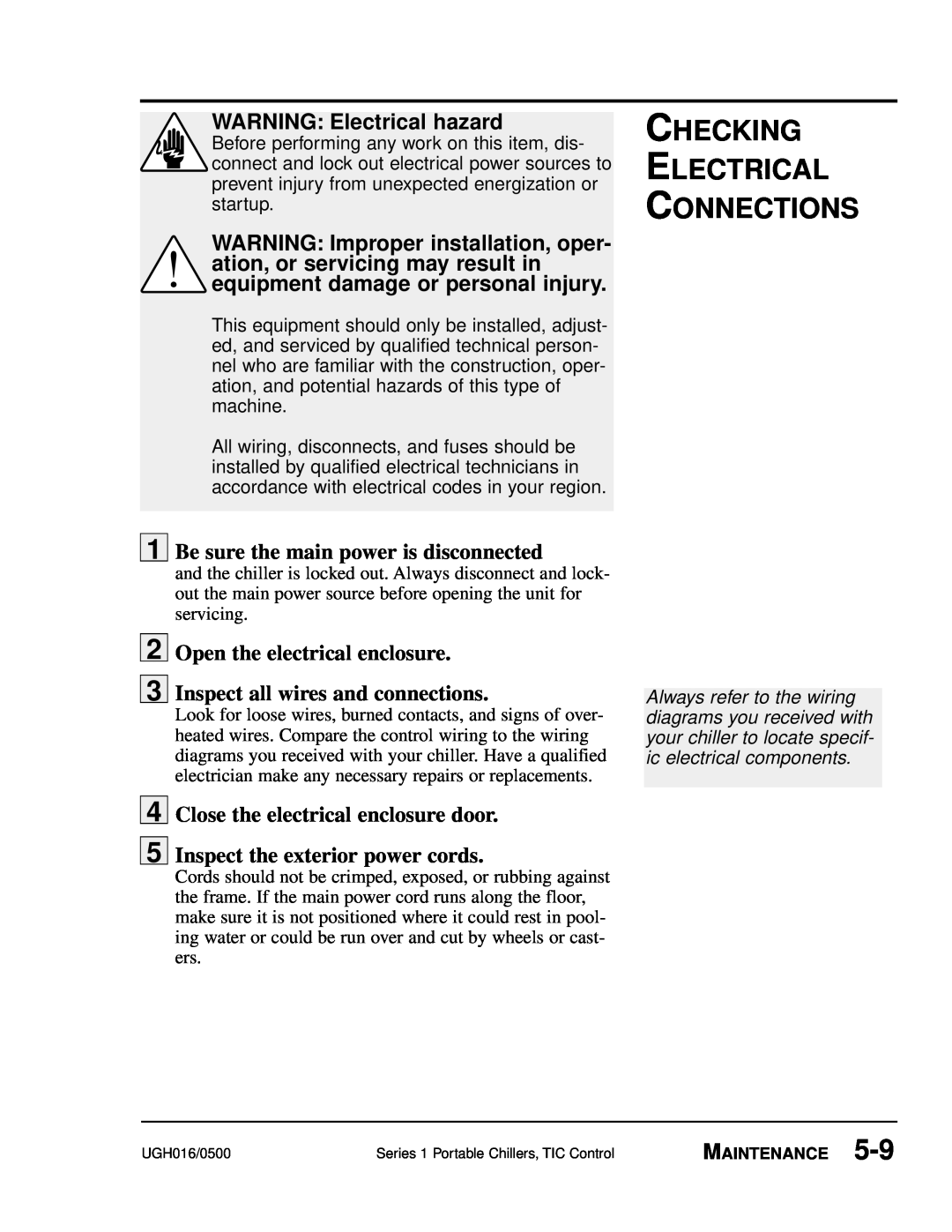Air-CooledModels A1 with TIC Control
Series 1 Water-CooledW1 and
Installation Operation Maintenance
Troubleshooting
Phase Cycle
Model numbers Power specifications Amps Volts
Date Manual Number UGH016/0500 Serial numbers
INTRODUCTION
TABLE OF CONTENTS
DESCRIPTION
TROUBLESHOOTING
MAINTENANCE
PARTS AND DIAGRAMS . . . . . . . . . . . .P/D-1
TABLE OF CONTENTS
Purpose of the User Guide
INTRODUCTION
How the guide is organized
Your responsibilities as a user
HOW THE GUIDE IS ORGANIZED
PURPOSE OF THE USER GUIDE
YOUR RESPONSIBILITY AS A USER
CAUTION Hot Surfaces
WARNING Electrical hazard
CAUTION Ventilation hazard
READ THIS SO NO ONE GETS HURT
Page
DESCRIPTION
WHAT IS THE PORTABLE CHILLER?
Temperature
TYPICAL APPLICATIONS
LIMITATIONS
Cooling load
Process circulation
HOW IT WORKS WATER-COOLED PORTABLE CHILLER
DESCRIPTION
HOW IT WORKS
Refrigerant circulation
WATER-COOLED
CONT’D
DESCRIPTION
HOW IT WORKS AIR-COOLED PORTABLE CHILLER
AIR-COOLED PORTABLE CHILLER
HOW IT WORKS
DESCRIPTION
PORTABLE
CHILLER FEATURES
Water-cooledModels
Air-cooledModels
PORTABLE CHILLER FEATURES
2-10
SPECIFICATIONS
Dimensions in mm
Weight lb kg
Weight lb kg
Dimensions in mm
DESCRIPTION
MODEL
2-12
PUMP CURVES
60 HZ PUMP PERFORMANCE CURVES
50 HZ PUMP PERFORMANCE CURVES
INSTALLATION
CAUTION Lifting hazard
UNPACKING THE BOXES
CAUTION Hot Surfaces
WARNINGS AND CAUTIONS
CAUTION Ventilation hazard
A grounded power source
PREPARING FOR INSTALLATION
Available water source
3 Wrap threads with Mylar or Teflon tape
MAKING PROCESS PLUMBING CONNECTIONS
Connect the To Process valve and tubing on
Attach water hose to Fill/Drain valve
FILLING THE CHILLER
Open the Fill/Drain valve and fill chiller
Close the Fill/Drain valve
FILLING THE CHILLER
Change the minimum operating temperature
Open the Fill/Drain valve and fill chiller
Close the Fill/Drain valve
WARNING Refrigerant hazard
CHECKING REFRIGERANT CHARGE
Sight glass
2 Connect the power wires to the terminals
CONNECTING THE MAIN POWER SOURCE
4 Connect the ground wire to grounding lug
WARNING Electrical hazard
3-10
CHECKING ELECTRICAL CONNECTIONS
5 Turn on main power source
WARNING Electrical hazard
1 Turn on main power source
INITIALLY STARTING THE CHILLER
WARNING Initial startup
2 Press the Start Chiller button
3-12
STOPPING THE CHILLER
TIC Control Features
OPERATION
Changing Settings
Changing Temperature Scale
OPERATION
TIC CONTROL FEATURES
WARNING Electrical hazard
BEFORE STARTING
Checking electrical connections
Checking process fluid level in the pump tank
Press the Start Chiller button
STARTING STOPPING THE CHILLER
CHANGING THE SETPOINT TEMPERATURE
CHANGING SETTINGS
Temperature Setpoint
Temperature Scale
CHANGING TO AUTO TUNE MODE
CHANGING TEMPERATURE SCALE
2 Press the Enter button
3 Press the Up/Down arrows
4 Press the Menu button
CHANGING AUTO TUNE MODE
5 Use the Up/Down arrows to change
6 Press Enter button
3 Press the Up/Down arrows
SETTING THE TO PROCESS LOW LIMIT
MAINTENANCE
MAINTENANCE FEATURES
WARNING Electrical hazard
WARNING AND CAUTIONS
CAUTION Hot Surfaces
WARNING: Refrigerant hazard
Daily, or as often as needed
PREVENTATIVE MAINTENANCE SCHEDULE
Weekly, or as often as needed
Checking electrical connections
Cleaning
PREVENTATIVE MAINTENANCE SCHEDULE
Cleaning process fluid strainer
Cleaning the tank and float switch
WARNING Refrigerant hazard
CHECKING THE REFRIGERANT CHARGE
1 Prepare a 5% solution of Phosphoric acid
CLEANING THE EVAPORATOR OR WATER-COOLED CONDENSER
Back-flushthe solution through the
piping with fresh water after cleaning
Clean the dirty coils with a soft brush
CLEANING THE AIR-COOLED CONDENSER
coil cleaner
WARNING: Electrical hazard
3 Inspect all wires and connections
1 Be sure the main power is disconnected
5 Inspect the exterior power cords
CHECKING ELECTRICAL CONNECTIONS
5-10
CHECKING RESERVOIR LEVEL
Disconnect and lockout power to the chiller
WARNING Electrical hazard
TROUBLESHOOTING
A FEW WORDS OF CAUTION
BEFORE BEGINNING
WARNING Electrical hazard
WARNING: Refrigerant hazard
TIME
IDENTIFYING THE CAUSE OF A PROBLEM
Alarm Condition
ANSWERING AN ALARM
Pump
Compressor
Symptom
CONTROL PROBLEMS
Solution
Power is not reaching the chiller
Symptom
CONTROL PROBLEMS
Solution
There is a phase loss
Alarm
MECHANICAL CONDITIONS
Solution
Failed Level switch
Solution
Alarm
Switch any two of the three
main power leads to the pump
Alarm
Possible cause Solution
Faulty contactor
Faulty overload module
SOLUTION
Alarm
Faulty contactor
Faulty overload module
Solution
Alarm
Specifications in the
MECHANICAL CONDITIONS
Solution
Alarm
Faulty water regulating valve
Faulty pressure switch
Solution
Alarm
failed flow switch and
The pressure switch is
Solution
Symptom
Contact Conair Service
MECHANICAL CONDITIONS
1 Disconnect and lockout power to the chiller
CHECKING AND REPLACING SWITCHES
3 Check the switch
4 Replace the switches as needed
Disconnect and lockout power to the chiller
REPLACING THE CONTACTOR
Disconnect the wiring from the contactor
Reconnect the wiring and reconnect power
1 Disconnect and lockout power to the chiller
CHECKING AND REPLACING THE
5 Disconnect the RTD wiring from the
7 Install the new RTD
1 Disconnect and lockout power to the chiller
REPLACING THE TEMPERATURE CONTROLLER
2 Snap the Temperature Controller board out
4 Contact Conair Service for the temperature
1 Disconnect and lockout power to the chiller
REPLACING OVERLOAD MODULES
4 Disconnect auxiliary wiring to the module
6 Install the new module
Disconnect and lockout power to the chiller
REPLACING FUSES
Restore power to the chiller
WARNING Electrical hazard
Remove the bolts connecting the pump
REMOVING PUMP COMPONENTS
Remove the pump assembly
Inspect, clean, and replace pump parts
TIME
CHECKING PRESSURE SWITCHES
Locate the pressure switch
Check the control signal in the electrical panel
4 Check the continuity within the switch
CHECKING PRESSURE SWITCHES
CONT’D
Description
Page
HOW TO CONTACT CUSTOMER SERVICE
WE’RE HERE TO HELP
CALL
BEFORE YOU
WARRANTY LIMITATIONS
EQUIPMENT GUARANTEE PERFORMANCE WARRANTY
A-2 SERVICE INFORMATION WARRANTY INFORMATION
Date Maintenance Item
MAINTENANCE LOG
Suction pressure Evaporator water out temperature
Condenser Water Temperature, In/Out
Page
PRESSURE
Evaporator and Piping
Pressure Drops
TABLES
TABLES
PRESSURE
APPENDIX C-2
W1-1.5
Setting
CONTROL SETTINGS
Display
Parameter
Page
P/D-1
PARTS & DIAGRAMS
P/D-2
RECOMMENDED SPARE PARTS
Part Number Description
Part Number Description
RECOMMENDED SPARE PARTS
Motor Starter Protector 20.0-25.0A
RECOMMENDED SPARE PARTS
20973003 Flowtect, Flow Switch, Evap Circuit
Part Number Description
Part Number Description
RECOMMENDED SPARE PARTS
29213105 TXV 2 ton Water- and Air-cooled
Part Number Description
RECOMMENDED SPARE PARTS
Condenser Fan Motor, 1/2HP, 575V, 60Hz, for A1-7.5

